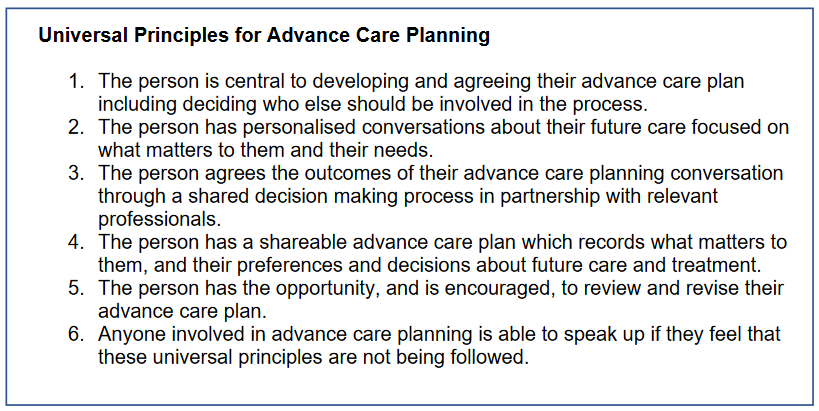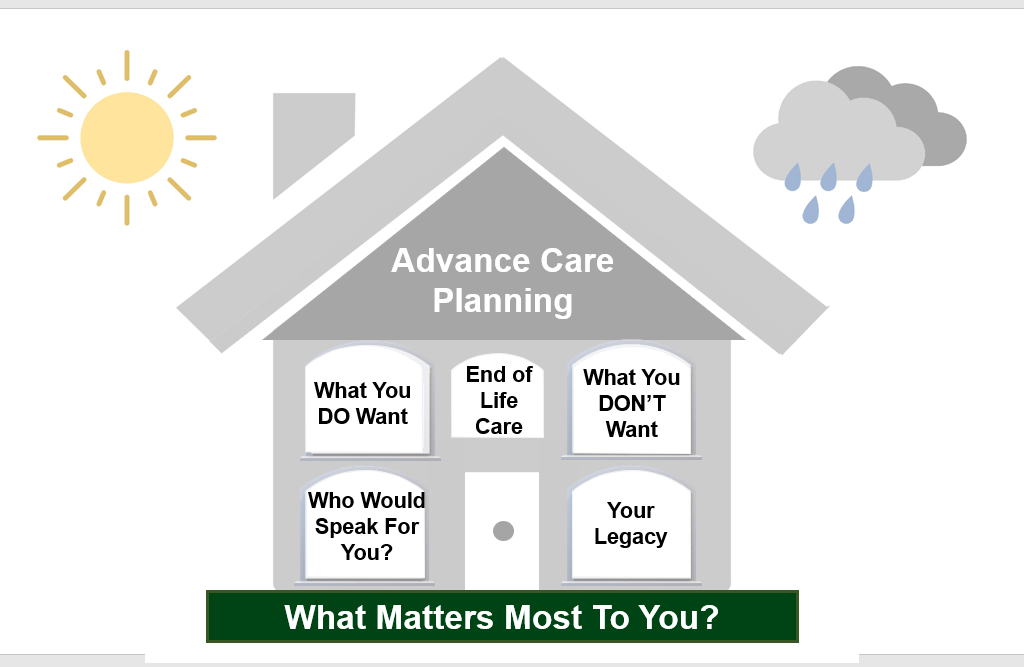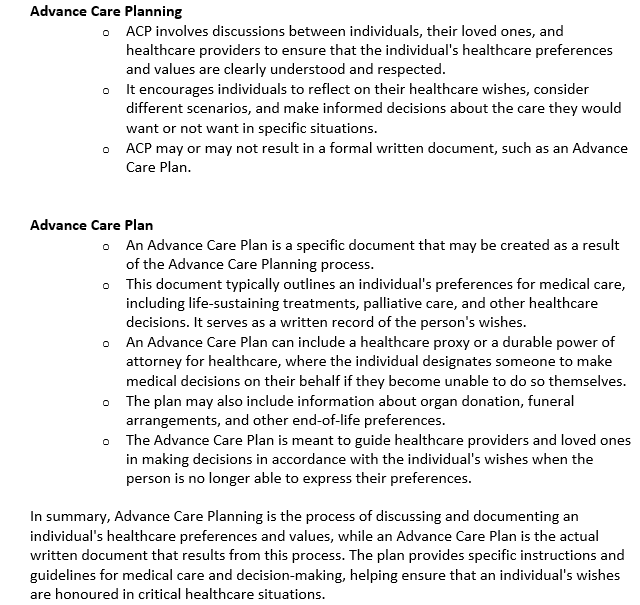What is the difference between Advance Care Planning and an Advance Care Plan?
Advance Care Planning and an Advance Care Plan are related concepts, this blog explores what each term means and the intersection between them.
Advance Care Planning
Advance Care Planning is a process, not a document. It is a comprehensive approach to thinking about, discussing, and documenting preferences and values for future care, and the focus of Advance Care Planning will vary according to a person’s life circumstance.
NHSE published the Universal Principles for Advance Care Planning in March 2022 in which six key principles are identified. The guidance sets out universal principles for a personalised approach to Advance Care Planning with an intent to promote a “consistent national approach” to ‘what good looks like’ in advance care planning in England”.
You can read the guidance in full here. The guidance provides high level principles and sets out an approach, what it doesn’t do is provide a how to guide of how to “do” Advance Care Planning. Indeed, it can’t because it is so different for everyone.
I have found that the terms Advance Care Planning and Advance Care Plan are often misunderstood by healthcare professionals, either because it’s thought to be just associated with end of life or it’s just too complicated. It is the same with the members of the public too – and not really a dinner table conversation. I am on a mission to improve professional understanding, raise public awareness and normalise discussion about Advance Care Planning and have created a simple infographic to explain the elements of Advance Care Planning. The concept can be adapted for any healthcare setting or personal circumstance and I’ll explain how.
I’ll start by saying again there is no one right way to do Advance Care Planning; there are right principles (outlined above) and I offer the following framework as a step to creating more concrete plans from principles. This is the second iteration of the Getting Your House in Order infographic and no doubt it will become more refined over time.
Advance Care Planning: Getting your house in order
You can read a little more about the framework in the blog Advance Care Planning: Getting Your House in Order. The basic idea is to demonstrate the basis for Advance Care Planning through a foundation of What Matters Most, then to break down components of Advance Care Planning into different windows. I’ll give a detailed look through each window at the free online teaching Advance Care Planning: normalising planning ahead for everyone in March next year (if you would like a session for your team or organisation contact me. The beauty and simplicity of the framework is it can be adapted for any healthcare setting or any person.
So Advance Care Planning is a process, a series of discussions, something that changes over time and a normal part of life. Organ donation, making a will or Lasting Power of Attorney are all parts of Advance Care Planning. I have blogged previously about Advance Care Planning and End of Life Care and set out what might be considered in the last months and days of life of Advance care Planning.
Advance Care Plan
An Advance Care Plan is simply the output of an Advance Care Planning discussion, again there is not one way of doing an Advance Care Plan. We don’t have a universally used national template, so my call to action is to find out what is used in your area. An Advance Care Plan will typically contain personal information, a statement of things you want (possibly called preferences and wishes), space to capture who to contact in an emergency, (and what to do, this may be in the form of a ReSPECT or a Treatment Escalation Plan). An Advance Care Plan may also have specific places to write down how you would like care at the very end of life.
I have started my Advance Care Plan, basically pulling together my Advance Care Planning to date which includes the following:
A statement of what Matters Most to Me, my values in life & things that give my life meaning and quality
A decision on Organ Donation
Lasting Power of Attorney (for both Property & Finance and Health & Welfare)
Will
Tentative funeral planning
Beginning of a Digital Legacy
I hope this demonstrates how Advance Care Planning slots into normal life planning, the list above doesn’t need a life limiting diagnosis to initiate.
Writing this blog led me to have a look at what ChatGPT had to say about the differences between Advance care Planning and an Advance Care Plan – it’s not bad! I entered: “write a blog about an advance care plan and advance care planning explaining the differences between them” and you can see what the result was below.
In summary, Advance Care Planning is a process. It is built on a foundation of what matters most and can be considered as including what you do want, what you don’t want, who would speak for you and your legacy. Part of, but by not all, Advance Care Planning is about care towards the end of life. An advance Care Plan is an output of Advance Care Planning and will be different for everyone.
It really is never to soon to start Advance Care Planning, or getting your house in order, but it can be too late.
Contact me to find out about how I can help you create your Advance Care Plan
If the blog has helped you or provided information and you would like to support my ongoing work, head to Buy me a coffee – thank you!




